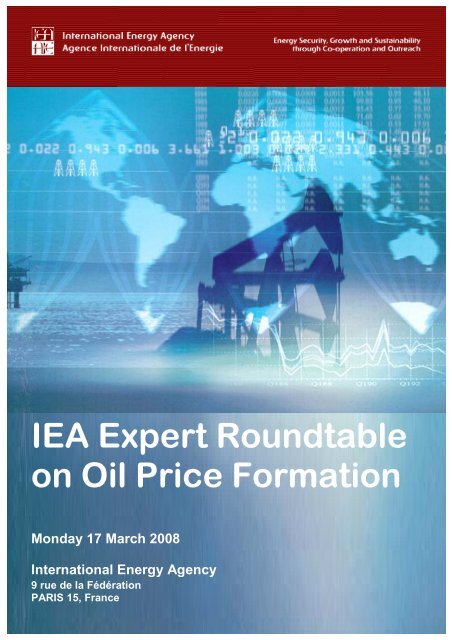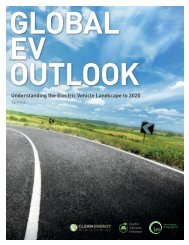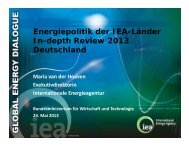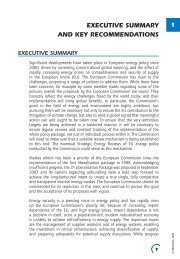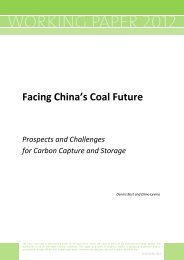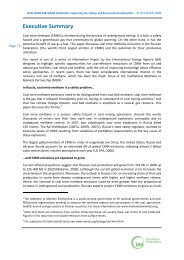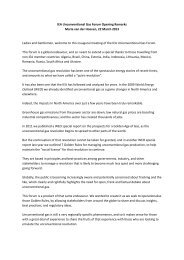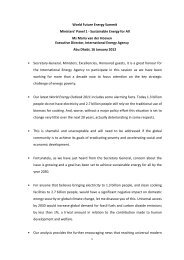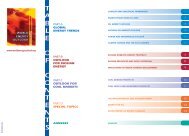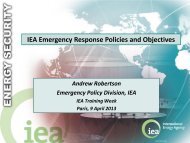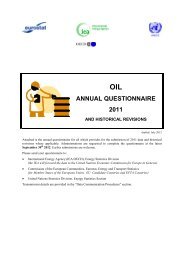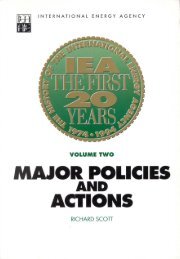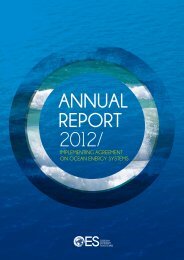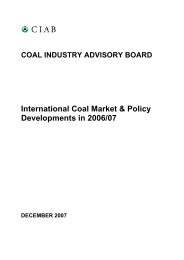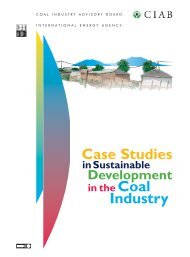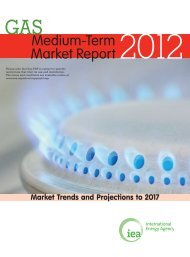IEA Expert Roundtable on Oil Price Formation
IEA Expert Roundtable on Oil Price Formation
IEA Expert Roundtable on Oil Price Formation
Create successful ePaper yourself
Turn your PDF publications into a flip-book with our unique Google optimized e-Paper software.
<str<strong>on</strong>g>IEA</str<strong>on</strong>g> <str<strong>on</strong>g>Expert</str<strong>on</strong>g> <str<strong>on</strong>g>Roundtable</str<strong>on</strong>g><br />
<strong>on</strong> <strong>Oil</strong> <strong>Price</strong> Formati<strong>on</strong><br />
M<strong>on</strong>day 17 March 2008<br />
Internati<strong>on</strong>al Energy Agency<br />
9 rue de la Fédérati<strong>on</strong><br />
PARIS 15, France
Introducti<strong>on</strong><br />
<str<strong>on</strong>g>IEA</str<strong>on</strong>g> <str<strong>on</strong>g>Expert</str<strong>on</strong>g> <str<strong>on</strong>g>Roundtable</str<strong>on</strong>g> <strong>on</strong> <strong>Oil</strong> <strong>Price</strong> Formati<strong>on</strong><br />
Background<br />
With oil prices having recently hit $100 a barrel and trading near record nominal and inflati<strong>on</strong>adjusted<br />
highs, the market is c<strong>on</strong>tinually questi<strong>on</strong>ing whether current oil prices are justified by<br />
market fundamentals. In particular, following the large flows of m<strong>on</strong>ey into hedge funds and<br />
commodity index funds since 2003, there is c<strong>on</strong>cern that the oil price no l<strong>on</strong>ger retains its role as<br />
the best leading indicator of market c<strong>on</strong>diti<strong>on</strong>s.<br />
C<strong>on</strong>siderable work has already g<strong>on</strong>e into understanding the role of funds and fundamentals in oil<br />
price formati<strong>on</strong>, but the debate is often polarised. The purpose of this <str<strong>on</strong>g>Roundtable</str<strong>on</strong>g>, held under the<br />
Chatham House Rule, is to get together world-renowned oil analysts and experts in an attempt to<br />
improve the understanding of the issues and identify further work. Rather than replicating the<br />
many c<strong>on</strong>ferences that have been held <strong>on</strong> this subject, the aim is to debate the arguments and<br />
come up with new ideas and new approaches.<br />
Outline<br />
Sessi<strong>on</strong> 1<br />
Four analysts set the scene by giving differing perspectives <strong>on</strong> the oil market: for and against the<br />
m<strong>on</strong>ey flows, oil’s evolving eras and a fundamental perspective. The ensuing discussi<strong>on</strong> will seek<br />
to debate the merits of these arguments; identify areas that have not been discussed; what factors<br />
are driving the oil price and whether current price levels reflect market c<strong>on</strong>diti<strong>on</strong>s.<br />
Sessi<strong>on</strong> 2<br />
Building <strong>on</strong> the discussi<strong>on</strong> from Sessi<strong>on</strong> 1, the afterno<strong>on</strong> will look at new data <strong>on</strong> hedge funds and<br />
discuss the gaps in our understanding of the broader oil market. More data naturally provide<br />
more informati<strong>on</strong>, but potentially at a cost. We have to try to identify where there are data gaps<br />
and, crucially, where filling those gaps would provide a real improvement in market understanding.<br />
Next Steps<br />
The <str<strong>on</strong>g>IEA</str<strong>on</strong>g> Secretariat will pull together a summary document, incorporating as far as possible the<br />
many different strands of argument that are likely to emerge during the meeting, gaps in our<br />
understanding and to identify where more work is needed.
Programme<br />
M<strong>on</strong>day 17 March<br />
08.45 Registrati<strong>on</strong><br />
<str<strong>on</strong>g>IEA</str<strong>on</strong>g> <str<strong>on</strong>g>Expert</str<strong>on</strong>g> <str<strong>on</strong>g>Roundtable</str<strong>on</strong>g> <strong>on</strong> <strong>Oil</strong> <strong>Price</strong> Formati<strong>on</strong><br />
09.00 Opening and Welcome<br />
Mr. Didier Houssin – Director of the Office of <strong>Oil</strong> Markets and Emergency Preparedness,<br />
Internati<strong>on</strong>al Energy Agency<br />
Chairman: Mr. Lawrence Eagles, Head of the <strong>Oil</strong> Industry and Markets Divisi<strong>on</strong>, Internati<strong>on</strong>al Energy Agency<br />
Funds or Fundamentals<br />
09.10 Prof. Robert Weiner, Professor of Internati<strong>on</strong>al Business, Public Policy and Public<br />
Administrati<strong>on</strong> and Internati<strong>on</strong>al Affairs, George Washingt<strong>on</strong> University – Assessing<br />
the Impact of N<strong>on</strong>-Commercial Traders<br />
09.30 Dr Philip K. Verleger, Jr., Ec<strong>on</strong>omist, PK Verleger LLC – The Index Fund Effect<br />
09.50 Mr. John Brunt<strong>on</strong>, Head of Global Analysis, Energy, Transportati<strong>on</strong> and Industrial<br />
Platform, Cargill Internati<strong>on</strong>al S.A. – The Three Stages of <strong>Oil</strong> Market Evoluti<strong>on</strong><br />
10.10 Mr. Mark Lewis, Managing Director, EMC-(Energy Market C<strong>on</strong>sultants (UK) Ltd./FACTS) -<br />
Fundamental Driving Forces of the <strong>Oil</strong> Market<br />
10.30 - 10.50 - Coffee<br />
11.40 Discussi<strong>on</strong>:<br />
• What drives the price of oil? - Assessing the arguments presented, alternative views;<br />
• Are oil prices reflecting current supply and demand c<strong>on</strong>diti<strong>on</strong>s or future expectati<strong>on</strong>s?<br />
• What other factors play a role in price formati<strong>on</strong> – benchmarks, spare capacity, investment etc.?<br />
• Do current tightness in oil service sector, rising F&D costs, the restricti<strong>on</strong> of access to resources and<br />
the changing fiscal terms justify the rise in the oil price?<br />
• Modelling a dynamic market: is it realistic to break down oil prices into their c<strong>on</strong>stituent parts?<br />
• Weaknesses in our understanding.<br />
13.00 - Buffet Lunch [<str<strong>on</strong>g>IEA</str<strong>on</strong>g>]<br />
Data Availability<br />
14.00 Dr. Jeff Harris – Chief Ec<strong>on</strong>omist, Commodity Futures Trading Commissi<strong>on</strong> (CFTC) –<br />
Index Funds and Data Disseminati<strong>on</strong><br />
14.40 Discussi<strong>on</strong><br />
• Has the ec<strong>on</strong>omic influence of speculators changed?<br />
• What are the areas of data deficiency – financial or physical?<br />
• What are the cost and benefits of more data?<br />
• What additi<strong>on</strong>al work needs to be carried out?<br />
16.30 - Close<br />
<str<strong>on</strong>g>IEA</str<strong>on</strong>g> <str<strong>on</strong>g>Expert</str<strong>on</strong>g> <str<strong>on</strong>g>Roundtable</str<strong>on</strong>g> <strong>on</strong> <strong>Oil</strong> <strong>Price</strong> Formati<strong>on</strong> ❖ Paris ❖ M<strong>on</strong>day 17 March 2008 3
Speaker Synopsis<br />
<str<strong>on</strong>g>IEA</str<strong>on</strong>g> <str<strong>on</strong>g>Expert</str<strong>on</strong>g> <str<strong>on</strong>g>Roundtable</str<strong>on</strong>g> <strong>on</strong> <strong>Oil</strong> <strong>Price</strong> Formati<strong>on</strong><br />
Prof. Robert Weiner - George Washingt<strong>on</strong> University<br />
Assessing the Impact of N<strong>on</strong>-Commercial Traders<br />
Prof. Weiner will present his analysis of data from the CFTC and US exchanges. Outlining the<br />
methodology he has used for this analysis, he will discuss the c<strong>on</strong>cept of herding and why it is<br />
important when c<strong>on</strong>sidering the impact of fund and speculative activity <strong>on</strong> prices before describing the<br />
data he has used and the limitati<strong>on</strong>s of the analysis.<br />
Dr. Philip K. Verleger, Jr. - PK Verleger LLC<br />
The Index Fund Effect<br />
Dr. Verleger will outline his perspective of how the cash from pensi<strong>on</strong> funds promoted inventory<br />
accumulati<strong>on</strong> and how that may have led to higher prices, because OPEC refused to compensate for<br />
increased demand by boosting producti<strong>on</strong>.<br />
Mr. John Brunt<strong>on</strong> - Cargill Internati<strong>on</strong>al S.A.<br />
The Three Stages of <strong>Oil</strong> Market Evoluti<strong>on</strong><br />
Mr. Brunt<strong>on</strong> will summarise how the oil market has evolved since the beginning of the decade and the<br />
inter-relati<strong>on</strong>ships between funds and fundamentals<br />
Mr. Mark Lewis - Energy Market C<strong>on</strong>sultants (UK) Ltd./FACTS<br />
Fundamental Driving Forces of the <strong>Oil</strong> Market<br />
Mr.Lewis will discuss the physical supply, demand and investment issues that have influenced the oil<br />
market since 2003.<br />
Dr. Jeff Harris - Commodity Futures Trading Commissi<strong>on</strong> (CFTC)<br />
Index Funds and Data Disseminati<strong>on</strong><br />
Dr. Harris will discuss the trial publicati<strong>on</strong> of index fund data for n<strong>on</strong>-oil commodities, and its<br />
implicati<strong>on</strong>s, al<strong>on</strong>g with broader issues for data disseminati<strong>on</strong>.<br />
4 <str<strong>on</strong>g>IEA</str<strong>on</strong>g> <str<strong>on</strong>g>Expert</str<strong>on</strong>g> <str<strong>on</strong>g>Roundtable</str<strong>on</strong>g> <strong>on</strong> <strong>Oil</strong> <strong>Price</strong> Formati<strong>on</strong> ❖ Paris ❖ M<strong>on</strong>day 17 March 2008
Practical Informati<strong>on</strong><br />
Hotels Close to the <str<strong>on</strong>g>IEA</str<strong>on</strong>g><br />
How to Get to the <str<strong>on</strong>g>IEA</str<strong>on</strong>g><br />
Public Transport Informati<strong>on</strong><br />
Coach Services from the Airports<br />
RER (Réseau Express Régi<strong>on</strong>al)<br />
Bus<br />
Taxi<br />
Metro<br />
For informati<strong>on</strong>/advice <strong>on</strong> transfer details/hotels, please c<strong>on</strong>tact:<br />
Anne Mayne<br />
Internati<strong>on</strong>al Energy Agency<br />
9 rue de la Fédérati<strong>on</strong><br />
Paris XV<br />
Brid Deely<br />
Internati<strong>on</strong>al Energy Agency<br />
9 rue de la Fédérati<strong>on</strong><br />
Paris XV<br />
+33 1 40 57 65 96<br />
+33 1 40 57 65 99<br />
anne.mayne@iea.org<br />
+33 1 40 57 67 31<br />
+33 1 40 57 65 99<br />
bridget.deely@iea.org
Hotels Close to the <str<strong>on</strong>g>IEA</str<strong>on</strong>g><br />
<strong>Price</strong>s approximate – Please ensure you request the OECD/<str<strong>on</strong>g>IEA</str<strong>on</strong>g> RATE (where applicable)<br />
Paris 15th Arr<strong>on</strong>dissement<br />
Hotel<br />
Hotel Paris Hilt<strong>on</strong><br />
18 avenue de Suffren<br />
75015 PARIS<br />
C<strong>on</strong>tact Details<br />
+33 (0)1 44 38 56 00<br />
+33 (0)1 45 78 91 42<br />
reservati<strong>on</strong>.paris@hilt<strong>on</strong>.com<br />
WEB www.hilt<strong>on</strong>.com<br />
Room Rates (* Special OECD/<str<strong>on</strong>g>IEA</str<strong>on</strong>g><br />
Rates)<br />
Room: €249 (exclusive of breakfast)<br />
Room: €269 (inclusive of breakfast)<br />
Hotel Mercure Suffren****<br />
20 rue Jean Rey<br />
75015 PARIS<br />
+33 (0)1 45 78 50 00<br />
+33 (0)1 44 38 56 10<br />
H2175@accor.com<br />
WEB www.mercure.com<br />
* Room: €135 -€195 (Special OECD<br />
Online Rate, inclusive of breakfast)<br />
See separate attachment:<br />
(OECD Rate Online Booking Instructi<strong>on</strong>s)<br />
Hotel Mercure Tour<br />
Eiffel***<br />
64 boulevard de Grenelle<br />
75015 PARIS<br />
+33 (0)1 45 78 90 90<br />
+33 (0)1 45 78 95 55<br />
hotel@mercuretoureiffel.com<br />
WEB www.mercuretoureiffel.com<br />
Room: €210<br />
Breakfast: €15<br />
Hotel Europe***<br />
103 boulevard de Grenelle<br />
75015 PARIS<br />
+33 (0)1 47 34 07 44<br />
+33 (0)1 45 66 47 13<br />
c<strong>on</strong>tact@europehotelparis.com<br />
WEB www.europehotelparis.com<br />
* Single Room: €95<br />
(excluding breakfast)<br />
Hotel Campanile<br />
30 rue Saint-Charles<br />
75015 PARIS<br />
+33 (0)1 45 78 61 33<br />
+33 (0)1 45 79 41 13<br />
paris.toureiffel@campanile.fr<br />
WEB www.campanile.com/hotel/en/hotel-012521.htm<br />
* Room: €71<br />
Breakfast: €8<br />
Paris 16th Arr<strong>on</strong>dissement<br />
Hotel<br />
Hotel Passy Eiffel***<br />
10 rue de Passy<br />
75016 PARIS<br />
C<strong>on</strong>tact Details<br />
+33 (0)1 45 25 55 66<br />
+33 (0)1 42 88 89 86<br />
___ @___<br />
WEB www.passyeiffel.com<br />
Room Rates (* Special OECD/<str<strong>on</strong>g>IEA</str<strong>on</strong>g><br />
Rates)<br />
Room: €140-€175<br />
Breakfast: €11<br />
Hotel Gavarni**<br />
5 rue Gavarni<br />
75016 PARIS<br />
+33 (0)1 45 24 52 82<br />
+33 (0)1 42 88 89 86<br />
reservati<strong>on</strong>@gavarni.com<br />
WEB www.gavarni.com<br />
Single Room: €135-165<br />
(excluding breakfast)<br />
Hotel Regina Passy<br />
6 rue de la Tour<br />
75116 PARIS<br />
+33 (0)1 55 74 75 75<br />
+33 (0)1 40 50 70 62<br />
regina@gofornet.com<br />
WEB www.hotel-paris-passy.com<br />
Double Room: €149<br />
Breakfast: €10 - €15<br />
6 <str<strong>on</strong>g>IEA</str<strong>on</strong>g> <str<strong>on</strong>g>Expert</str<strong>on</strong>g> <str<strong>on</strong>g>Roundtable</str<strong>on</strong>g> <strong>on</strong> <strong>Oil</strong> <strong>Price</strong> Formati<strong>on</strong> ❖ Paris ❖ M<strong>on</strong>day 17 March 2008
Practical Informati<strong>on</strong><br />
How to Get to the <str<strong>on</strong>g>IEA</str<strong>on</strong>g><br />
Internati<strong>on</strong>al Energy Agency, 9 rue de la Fédérati<strong>on</strong> – PARIS 15<br />
Teleph<strong>on</strong>e (<str<strong>on</strong>g>IEA</str<strong>on</strong>g> Recepti<strong>on</strong>): 01 40 57 65 00<br />
[Métro: Bir-Hakeim (Line 6) RER C: Champs de Mars, Tour Eiffel] Bus: 42, 82<br />
Internati<strong>on</strong>al<br />
Energy Agency
Public Transport Informati<strong>on</strong><br />
Coach Services from the Airports<br />
Two companies (Cars Air France and Roissybus) operate good services from the airport to the centre of Paris.<br />
Air France Coaches<br />
RER (Réseau Express Régi<strong>on</strong>al)<br />
Central Paris is easiily accessible from both Charles de Gaulle and Orly Airports using the RER (Réseau Express<br />
Régi<strong>on</strong>al).<br />
The <str<strong>on</strong>g>IEA</str<strong>on</strong>g> can be reached by using RER C (Champs de Mars, Tour Eiffel).<br />
Bus<br />
Lines 42 and 82 stop nearby the <str<strong>on</strong>g>IEA</str<strong>on</strong>g>.<br />
Taxi<br />
There are ample taxis available at airports and train stati<strong>on</strong>s; a taxi rank is always close by in central Paris.<br />
Metro<br />
The closest metro stop to the <str<strong>on</strong>g>IEA</str<strong>on</strong>g> is <strong>on</strong> Line 6, Bir-Hakeim.<br />
8 <str<strong>on</strong>g>IEA</str<strong>on</strong>g> <str<strong>on</strong>g>Expert</str<strong>on</strong>g> <str<strong>on</strong>g>Roundtable</str<strong>on</strong>g> <strong>on</strong> <strong>Oil</strong> <strong>Price</strong> Formati<strong>on</strong> ❖ Paris ❖ M<strong>on</strong>day 17 March 2008
<strong>Oil</strong> Market Report - C<strong>on</strong>tacts<br />
Editorial Enquiries<br />
Lawrence Eagles +33 (0*)1 40 57 65 90<br />
Editor/Head of the <strong>Oil</strong> Industry and Markets Divisi<strong>on</strong> lawrence.eagles@iea.org<br />
Eduardo Lopez +33 (0*)1 40 57 65 93<br />
<strong>Oil</strong> Demand Analysis<br />
eduardo.lopez@iea.org<br />
David Fyfe +33 (0*)1 40 57 65 94<br />
<strong>Oil</strong> Supply Analysis<br />
david.fyfe@iea.org<br />
Julius Walker +33 (0*)1 40 57 65 22<br />
<strong>Price</strong>s/OECD Stocks<br />
julius.walker@iea.org<br />
David Martin +33 (0*)1 40 57 65 95<br />
Refining<br />
david.martin@iea.org<br />
Toril Bos<strong>on</strong>i +33 (0*)1 40 57 66 36<br />
<strong>Oil</strong> Demand Analysis<br />
toril.bos<strong>on</strong>i@iea.org<br />
James Ryder +33 (0*)1 40 57 66 18<br />
Stocks/Freight/Trade<br />
james.ryder@iea.org<br />
Anne Mayne +33 (0*)1 40 57 65 96<br />
Editorial Assistant<br />
anne.mayne @iea.org<br />
Editorial Enquiries Fax: (+33) 0*1 40 57 65 99<br />
Media Enquiries<br />
<str<strong>on</strong>g>IEA</str<strong>on</strong>g> Press Office +33 (0*) 40 57 65 54<br />
ieapressoffice@iea.org<br />
* 0 <strong>on</strong>ly within France<br />
Subscripti<strong>on</strong> and Delivery Enquiries<br />
<strong>Oil</strong> Market Report Subscripti<strong>on</strong>s<br />
Internati<strong>on</strong>al Energy Agency<br />
BP 586-75726 PARIS Cedex 15, France<br />
e-mail: OMRSubscripti<strong>on</strong>s@iea.org<br />
Internati<strong>on</strong>al Energy Agency, 9 rue de la Fédérati<strong>on</strong>, 75739 PARIS Cedex 15, France<br />
<strong>Oil</strong> Industry and Markets Divisi<strong>on</strong> – Direct Fax Line: +33 (0*)1 40 57 65 99 – (* 0 <strong>on</strong>ly within France)<br />
www.iea.org
RECENT <str<strong>on</strong>g>IEA</str<strong>on</strong>g> PUBLICATIONS<br />
<strong>Oil</strong> Supply Security - Emergency Resp<strong>on</strong>se of <str<strong>on</strong>g>IEA</str<strong>on</strong>g> Countries<br />
When Hurricane Katrina hit the Gulf of Mexico in 2005, the regi<strong>on</strong>’s oil producti<strong>on</strong> and refining infrastructure was<br />
devastated and world energy markets were disrupted. The Internati<strong>on</strong>al Energy Agency decided in a matter of days to<br />
bring 60 milli<strong>on</strong> barrels of additi<strong>on</strong>al oil to the market. The emergency resp<strong>on</strong>se system worked – the collective acti<strong>on</strong><br />
helped to stabilise global markets. Since its founding in 1974, oil supply security has been a core missi<strong>on</strong> of the <str<strong>on</strong>g>IEA</str<strong>on</strong>g> and<br />
the Agency has improved its mechanisms to resp<strong>on</strong>d to short-term oil supply disrupti<strong>on</strong>s. Nevertheless, numerous<br />
factors will c<strong>on</strong>tinue to test the delicate balance of supply and demand. <strong>Oil</strong> demand growth will c<strong>on</strong>tinue to accelerate<br />
in Asia; oil will be increasingly produced by a shrinking number of countries; and capacities in the supply chain will need<br />
to expand. These are just a few of the challenges facing an already tight market. What are the emergency resp<strong>on</strong>se<br />
systems of <str<strong>on</strong>g>IEA</str<strong>on</strong>g> countries? How are their emergency structures organised? How prepared is the <str<strong>on</strong>g>IEA</str<strong>on</strong>g> to deal with an oil<br />
supply disrupti<strong>on</strong>?<br />
World Energy Outlook 2007 – China and India Insights<br />
World leaders have pledged to act to change the energy future. Some new policies are in place. But the trends in energy<br />
demand, imports, coal use and greenhouse gas emissi<strong>on</strong>s to 2030 in this year’s World Energy Outlook are even worse<br />
than projected in WEO 2006.<br />
China and India are the emerging giants of the world ec<strong>on</strong>omy. Their unprecedented pace of ec<strong>on</strong>omic development<br />
will require ever more energy, but it will transform living standards for billi<strong>on</strong>s. There can be no questi<strong>on</strong> of asking them<br />
selectively to curb growth so as to solve problems which are global. So how is the transiti<strong>on</strong> to be achieved to a more<br />
secure, lower-carb<strong>on</strong> energy system?<br />
WEO 2007 provides the answers. With extensive statistics, projecti<strong>on</strong>s in three scenarios, analysis and advice, it shows China,<br />
India and the rest of the world why we need to co-operate to change the energy future and how to do it.<br />
Natural Gas Market Review 2007<br />
Natural gas heats our homes, powers our factories, and increasingly generates electricity, safely and cleanly. Over<br />
recent decades, it has been an important element of secure, affordable, and envir<strong>on</strong>mentally resp<strong>on</strong>sible energy supply.<br />
But as producti<strong>on</strong> from <str<strong>on</strong>g>IEA</str<strong>on</strong>g> member countries declines, supplies will have to come from sources in more distant regi<strong>on</strong>s.<br />
• What aspects of OECD gas markets need to be improved to deliver greater security and efficiency?<br />
• What are the risks of increasing reliance <strong>on</strong> imports from Russia and the Middle East?<br />
• Are strategic stocks of natural gas - similar to emergency oil stocks - a viable safety net to a supply disrupti<strong>on</strong>?<br />
• Will there be enough investment in pipeline gas or will more need to be spent <strong>on</strong> LNG?<br />
• What are the impacts of gas security <strong>on</strong> oil markets and power generati<strong>on</strong> security?<br />
• What do changes in the LNG industry mean for traditi<strong>on</strong>al c<strong>on</strong>tract terms?<br />
The Natural Gas Market Review 2007, the sec<strong>on</strong>d issue in a new <str<strong>on</strong>g>IEA</str<strong>on</strong>g> publicati<strong>on</strong>s series, addresses key questi<strong>on</strong>s in this<br />
dynamic market. It offers a global appraisal of current trends in the light of the most recent historical data, including<br />
supply and demand projecti<strong>on</strong>s to 2015.<br />
Energy Use in the New Millennium<br />
Trends in <str<strong>on</strong>g>IEA</str<strong>on</strong>g> Countries. At their Gleneagles Summit in July 2005, G8 leaders identified climate change and securing<br />
clean energy and sustainable development as key global challenges. They agreed that we must transform the way we<br />
use energy and that we must start now. Improved energy efficiency is essential to meeting this goal. Therefore, the G8<br />
asked the <str<strong>on</strong>g>IEA</str<strong>on</strong>g> to provide analysis of energy use and efficiency developments in buildings, appliances, transport and<br />
industry. This publicati<strong>on</strong> is a resp<strong>on</strong>se to the G8 request. Looking back, it shows how changes in energy efficiency,<br />
ec<strong>on</strong>omic structure, income, prices and fuel mix have affected recent trends in energy use and CO2 emissi<strong>on</strong>s in <str<strong>on</strong>g>IEA</str<strong>on</strong>g><br />
countries. The results are a ‘wake-up call’ for us all.<br />
Since 1990, the rate of energy efficiency improvement in <str<strong>on</strong>g>IEA</str<strong>on</strong>g> countries has been less than 1% per year – much lower<br />
than in previous decades and not nearly enough to stem the growth of CO2 emissi<strong>on</strong>s. If we are to tackle climate change<br />
and move towards a sustainable energy future then this rate will need to double. We must – and we can – do better! By<br />
means of in-depth energy indicators, Energy Use in the New Millennium: Trends in <str<strong>on</strong>g>IEA</str<strong>on</strong>g> Countries provides important insights<br />
to policy-makers about current energy use and CO2 emissi<strong>on</strong> patterns that will help shape priorities for future acti<strong>on</strong>.<br />
ORDER ON LINE: www.iea.org/orderbooks.htm


